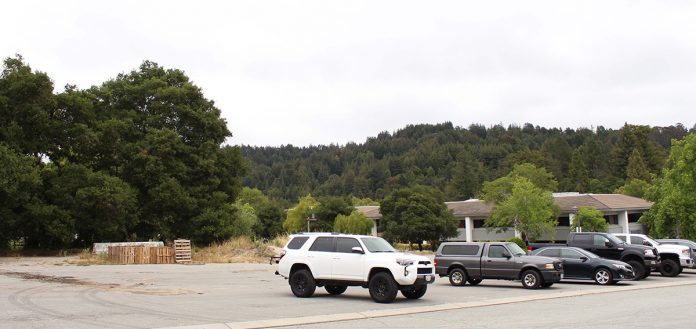Taking in a presentation during their June 16 meeting, Scotts Valley City Council members said there was a lot to like of what could become the next 10 Scotts Valley homes. They generally felt the 1.04-acre Bay Village Planned Development, with its six single-family dwellings and four duplexes of brown color palette along Erba Lane—near a wooded area with at least 36 live oak trees—was attractive, realistic and nuanced.
In veteran planner Charlie Eadie, of Eadie Consultants, and Bay Photo CEO Larry Abitbol, via SV Housing LLC, they’d found a responsive developer who’d taken a parcel sold off by the city (in the hopes of netting housing), and come up with a project featuring spacious balconies, a private lane and interesting art concepts.
Not only did the renderings presented to the City Council appear to factor in consumer desires with civic aspirations, but fire and police chiefs said there were no serious traffic or parking concerns. Abitbol added that some units would provide future housing for Bay Photo employees.
“The other thing, of course, is we’re trying to optimize the utilization of land,” Eadie said. “I think we ended up with a really nice project here.”
But underlying twin tensions—skyrocketing building costs, and the lack of affordable housing in the community—were at play as elected officials mulled whether to approve the subdivision.
Mayor Derek Timm noted the developer is only required to build one-and-a-half affordable units and pointed out they already lost two units—when rejigging plans after environmental concerns arose. Given how prices have been rising for building materials, there’s no point in negotiating for additional inexpensive units if that pushes overall project costs so high that nothing gets built, he said.
“The cost of timber has been spiking,” Vice-Mayor Jim Reed concurred.
Reed wondered if some of the three-bedroom units could be split into multiple rentals that are more affordable, by design.
Eadie said this would send them back to the drawing board and force another environmental review process. That’s something the city could’ve given direction on earlier, he added.
“It would be nice if every project could have a whole range of different options,” he said. “My dad always used to tell me, ‘You can’t squeeze blood out of a turnip.’”
It’s a “daunting” thought, Eadie said, to try to add extra affordable housing units to a project in the current construction climate.
If a project’s location falls within the city’s “inclusionary” housing boundaries, at least 15% of the proposed units must be “affordable.” The income restrictions for those “affordable” homes are determined by the Affordable Housing Committee, on which Mayor Timm and City Councilman Jack Dilles sit. On June 10, that committee decided to recommend one of two options the developer could comply with, for the City Council to approve.
Option 1 would require the building of two three-bedroom units—one low-income and one moderate-income. Option 2 would require one three-bedroom, low-income unit, plus the developer would have to pay an in-lieu fee to compensate the city for the additional half unit not included (the difference between the sales price of a moderate-income unit and a low-income unit—$175,000, according to Abitbol).
Reed wondered if it would make sense to make the “low-income” a “very-low-income” unit, alongside the “moderate-income” unit.
“I started out wanting two ‘lows’ myself,” Dilles replied, adding he even looked at the possibility of giving the developer additional breaks to promote that idea. “The more we talked, the big picture was to try and get one low—and whatever we could get beyond that.”
Council members, one by one, made it clear they preferred Option 1, two affordable units. The developer team wanted Option 2, noting their worries about building costs.
“I’m all for low-income housing, but we need to be able to build,” Abitbol said. “That was my concern.”
In the end, the City Council voted unanimously to approve the development and direct staff to work with the developer to try to get two affordable units and to bring it back to the council if they can’t figure out how to make that happen.
City Councilman Randy Johnson expressed his support for the project as a whole, noting, “I think it’s been a long time coming.” But he said he was concerned by how the city was handling the affordability question.
“It seems like the process is a little bit arbitrary,” he said, characterizing it as one developer being asked to do one thing, with another asked to do something else. “There isn’t a schedule.”
During the public hearing, some residents voiced concerns about increasing traffic flow, parking issues when residents choose not to use their garages for vehicles and the impact on local water resources. Others, like real estate broker David Webb, spoke up in favor.
“I think it will add value to Scotts Valley,” he said, noting there’s a giant need for housing in the area. “I think it’s a good deal.”
As a longtime horse rider, City Councilwoman Donna Lind said she’s acutely aware of how the community has become less rural and more urban over the decades. And sometimes it’s “sad” to see those changes occur, she noted. But, she stressed, this development “meets the needs that we have.”
Reed said while the developer did ask for a few minor exemptions, others have asked for 15-20.
“That’s not what we have here,” he said. “We do have a significant need for housing.”
Johnson called the proposal “reasonable,” and said he’s making his decision in the context of bills winding their way through Sacramento that aim to increase housing in California but wrest control out of the hands of local municipalities.
“I’m happy to endorse this project,” he said.









